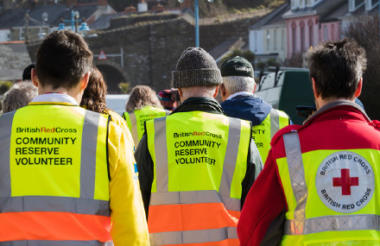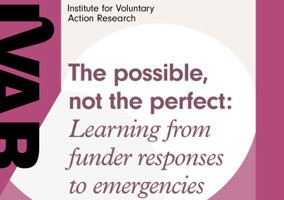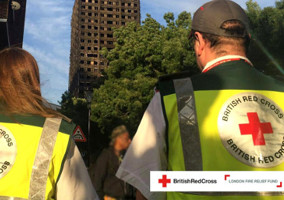The British Red Cross is almost a third of the way towards its target of recruiting 10,000 community reserve volunteers, ready to respond if an emergency happens in their local area. Simon Lewis, head of UK crisis response at the Red Cross, explains why they’re important.
A crisis can happen anywhere and at any time. Fires, floods, extreme weather, and national emergencies all regularly hit the headlines. Our teams across the UK respond to an emergency every four hours. For the people caught up in those incidents, the results can be devastating.
Our drive to sign up at least 10,000 community reserve volunteers by 2019 comes after last year proved to be one of the busiest in the history of the British Red Cross. We helped 9,265 people in almost 1,500 emergencies – from house fires to gas leaks to mass evacuations.
Last year we responded to an unprecedented number of major incidents. The Westminster terror attack, Manchester Arena bombing and London Bridge attack, closely followed by the Grenfell Tower fire and Finsbury Park Mosque attack, alongside hundreds of other emergencies.
We know how prevalent emergencies are in the UK, but we also see time and again how local communities rally to help when a crisis hits.
Mobilising kindness in our communities
Today, we are publishing a new report, together with our partner Aviva, which shows people’s concerns about the number of UK emergencies and their preparedness for them, as well as their willingness to get involved when disaster strikes. Aviva shares our values and our purpose. It supports thousands of customers every year when major events such as floods and fires occur, so we are working together to find ways to help communities when the unexpected happens.
The report, When Crisis Hits: mobilising kindness in our communities, brings together British Red Cross emergency response data and research with more than 4,000 UK adults. It shows that almost nine out of ten people (88 per cent) say that if an emergency happened in their community they would want to get involved.
This proves what we already know. We saw it in the outpouring of support and the extraordinary fundraising efforts after the Manchester Arena attack. We witnessed it again in the overwhelming public response to the Grenfell Tower fire. While these incidents brought tragedy to so many people, they also saw remarkable acts of kindness and community spirit as people rallied to help in any way they could.
Yet the findings also highlight many people don’t feel adequately informed about what crises could happen in their community; and more than half (53%) would not know what to do if a disaster did strike.
Harnessing the power of kindness in a crisis
Our research shows that two thirds of people who have experienced an emergency feel there is more their community could have done to help – if they had known how. The community reserve volunteers scheme addresses this by offering people the opportunity to help, in a coordinated way.
Having a network of community reserve volunteers could help to take the pressure off emergency services, local authorities and British Red Cross emergency response teams as they can undertake practical, behind-the-scenes activities specific to each emergency. Putting together food parcels, blowing up airbeds for rest centres, filling sandbags in times of flooding – simple tasks can make a big impact.
Becoming a community reserve volunteer
No matter how much we prepare, we cannot prevent every crisis, but we can help people to cope and recover. The findings of the report highlight just how much people want to be involved in helping their neighbours when the worst happens. It shows that people would in fact take great pride in being able to do so.
The community reserve volunteers programme, supported by Aviva, is an opportunity for the public to make a difference during a local emergency. We’ve made it quick and easy to sign up online and community reserve volunteers will be contacted by text when they’re needed. Specialist skills aren't required and training is provided at the scene.
A human-centred response
Following the significant events of 2017, we are more convinced than ever that effective emergency response is truly human-centred. It should focus on the individuals and communities at the heart of the crisis, acknowledge that people want to help, and give them an opportunity to do so.
We recognise that kindness is a powerful thing, and we think signing people up in advance is the best way to put that kindness to use. Whether it is distributing sandbags or sorting emergency provisions, we all have something to give.
|
Related articles












